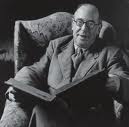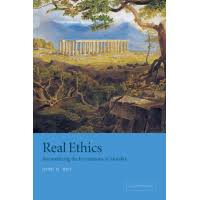
C.S. Lewis on the Reading of Old Books

C.S. Lewis' works have probably been as helpful to me as any other writings beside Scripture. The essay attached below, "On the Reading of Old Books," originally appeared as an introduction to Athanasius' On the Incarnation. Athanasius was a 4th century Christian who is credited as helping articulate a theological response to Arius, who denied the deity of Christ. Athanasius argued cogently for the deity of Christ. His short essay on the reading of old books is a minor classic itself and deserves repeated readings. Enjoy!
- Details
- Category: Recommended Reading Recommended Reading
- Published: 21 September 2010 21 September 2010
- Hits: 18958 18958
John Rist, Augustine, Sartre

Greetings folks. I have been fascinated by how many philosophers of different stripes turn to Augustine. This can be found in Descartes, Heidegger, Sartre, Camus, Derrida, etc. I currently am reading John Rist, Real Ethics: Reconsidering the Foundations of Morality. At one point he speaks to how one way of understanding Sartre is to see Sartre as affirming Augustine's anthropology (in a very general sense) while denying Augustine's doctrine of God. Here is what Rist writes:
Reflect on the universe proposed by Augustine without Augustine's God and we are left in the universe of Sartre, where values are constructed at random whenever 'honest' folk see the necessity, where hell is other people seen as ineluctably predatory, and where life itself seems an absurdity which can only be transcended in the ultimately hopeless or destructive pursuit of a genuinely 'free' act. (p. 43)
Rist's book is proving to be a great read.
- Details
- Written by Brad Green Brad Green
- Category: Recommended Reading Recommended Reading
- Published: 06 May 2017 06 May 2017
- Hits: 3041 3041
Bergson on Intellect, Intuition, and Instinct
Henri Bergson (1859-1941) is an extremely interesting figure. Bergson contended that in animal (and I would think human) development, there are two traits/emphases/characteristics which are at the heart of things: "instinct" and "intelligence." Bergson makes an interesting move. One might think that intelligence would be the key to true philosophy (if choosing between "instinct" and "intellect"). Au contraire! Rather, it is instinct which is key. Instinct, over times can/does morphe into "intuition," and it is intuition which is central to philosophy. So, as Gary Gutting summarizes: "Instinct then becomes intuition, the privileged vehicle of philosophical knowledge" (Gutting, French Philosophy in the Twentieth Century, 72).
Interesting indeed. What this does is, in a sense, put intellect in its place. It does not deny the importance of intellect, but does say that intellect must be seen in relationship to other ways of coming to terms with the world. I look forward to continuing reading.
- Details
- Written by Brad Green Brad Green
- Category: Recommended Reading Recommended Reading
- Published: 26 April 2017 26 April 2017
- Hits: 3936 3936
Henri Bergson and the Creation of the Self
One of the things I have been doing on my research leave is read (surprise!). Currently I am reading Gary Gutting, French Philosophy in the Twentieth Century. Besides just interesting, I hope to write one day a biblical theology of knowledge. That interest has led to reading this and that, including some philosophy. A few years ago I read Husserl, which led to reading several things by Albert Camus and Jean-Paul Sartre. The current chapter in Gutting's book is on Henri Bergson. I thought the following quote was fascinating, and something of a good summary of the modern mood, and the modern notion of the self:
"for a conscious being, to exist is to change, to change is to develop [se murir], to develop is to go on creating oneself endlessly."
(This is from Bergson's work L'evolution creatrice, and is quoted in Gutting, 66).
- Details
- Written by Brad Green Brad Green
- Category: Recommended Reading Recommended Reading
- Published: 26 April 2017 26 April 2017
- Hits: 3588 3588